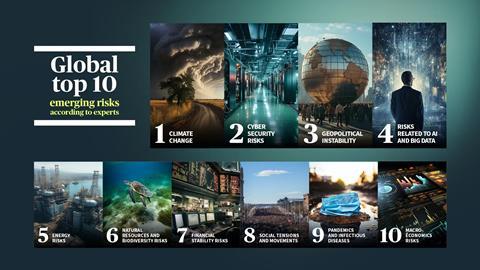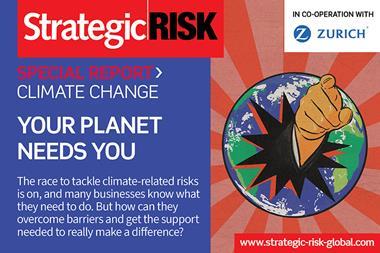A new survey asked 3,500 risk experts about the greatest emerging threats facing countries and companies today. We dig into the four key takeaways from the report
Now in its tenth year, the annual Axa Future Risks Survey asks people from around the world to rank their top ten future risks, based on their potential impact on society over the next five to ten years.
This year, almost 3,500 risk experts were surveyed from 50 countries. A further 19,016 members of the public were also polled.
Key findings
- 75% of experts think that risks are more and more interconnected
- 60% of people think that our society needs to take risks to progress
- 68% of people feel vulnerable to cyber-risks in their daily life
- 90% of experts say the risk of massive cyberattacks is significant at a global level
Here are four key lessons from the results:
Key lesson one: climate risks are broadening
Climate change was once again the top-ranked risk for experts and the general public alike, even though a lower percentage of experts than last year selected it as their top risk.
Concern about climate change is broadening: for the first time this year, it was top-ranked by both experts and the general public in every region.
A growing climate-related concern in 2023’s survey, is the backlash in some jurisdictions against companies for their commitments to ESG.
Thomas Buberl, CEO of AXA, said: ”Having topped the experts’ rankings since 2015, climate change becomes for the first time the public’s top risk across all geographies surveyed.
“Extreme weather events, droughts, fires, biodiversity loss… the increasingly tangible aspects of climate change underline the urgent need for concrete action.”

Key lesson two: Artificial intelligence (AI) is now a top-tier concern for experts
The big climber in the experts’ risk rankings was AI, jumping to 4th this year from 14th last year.
Axa found that 64% of risk experts and 70% of the general public believe there should be a break in research into AI and other disruptive technologies.
When we asked what prompted experts to choose this risk, the most popular answer was the potential of advanced AI to pose an existential threat to mankind.
However, AI risks are not even present in the public’s top ten, and the lack of awareness of these risks is particularly important in Europe.
Asian experts lead concern about automation and the future of work
Axa said: ”The potential for generative AI to displace jobs at scale is reflected in a sharp rise in the rankings this year for risks related to the future of work – up to 12th from 17th last year. Axa also saw a rise, from 33% to 37%, in the proportion of experts choosing this risk who said they were primarily motivated by automation fears.
”When asked what public authorities should prioritise in handling this risk, experts were almost twice as likely as last year (31% vs 16%) to mention raising awareness – indicating a belief that stakeholders have yet to fully grasp the far-reaching implications of recent technological developments for ensuring a sustainable future for the workforce.
”The future of work is a particular concern in Asia, where the risk rose to 9th from 16th last year. As a region that has traditionally been an early adopter of advanced technology, Asian markets may be more aware of the potential impact on the work landscape.”
Key lesson three: Cyber could be the next big global crisis
While cyber risk displaced geopolitical instability into third place, these risks are closely related. Cyber also ranked in the general public’s top three risks for the first time.
This year, Axa offered “cyber war” as an option for experts to explain why they chose this risk – and it was the second most common answer among experts in the US.
Overall, a shutdown of essential services and critical infrastructure was the most-mentioned concern.
Buberl said: ”A top-three threat since 2018, cyber risks return to second place. A direct consequence of the digital revolution and its impact on our lifestyles, it has also become a credible “weapon of war” on the geopolitical chessboard, and it remains closely linked to geopolitical risks, in third place this year.”
Key lesson four: Cautious optimism remains
When asked whether people are more or less vulnerable to risks than they were five years ago, experts increasingly say “more vulnerable” at both country level (84% this year, a rise from 76% in 2020) and city level (73%, up from 64% in 2020).
Indeed, in this year’s survey, experts take a generally pessimistic view of public authorities’ preparedness for the emergence of future risks. Only 7% of experts think authorities are prepared for AI risk, for example – the lowest of all the risks in the survey.
Just 15% think authorities are prepared for the emergence of their top risk, climate change – and in Europe and America, this figure is as low as 10% and 9% respectively.
However, in other parts of the survey, it is possible to detect cautiously rising optimism.
When Axa asked the public and experts which actors they would trust to handle a future crisis – such as scientists, companies, NGOs, armies, governments, or international organisations – it found the level of trust had risen across the board compared to last year.”
“Progress depends on risk prevention, heightened awareness, and open dialogue between institutions, political decisionmakers and private sector players”
A clear majority of people (60%) agree with the proposition that society cannot progress without taking risks. An even stronger majority of experts (67%) and the public (69%) believe that we have what it takes to fight and manage future risks – while 78% of the public and 85% of experts agree that a collective form of progress (benefiting individuals, economies, and society) is still within reach.
Global cooperation will be key to managing future crises and risks. A majority (52%) of the general public said they think the most effective solutions to future risks should be found at the global level, rather than the regional, national, or city level – a rise from 49% in 2022.
Finally, this year’s survey found a growing appreciation of the important role of insurers in tackling future risk (cited by 74% of the general public, up from 69% in 2022.
Buberl concluded: “Faced with these hybrid threats and the scale of the challenges involved, and despite a general perception of increasing vulnerability, I detect a renewed sense of hope and confidence: 85% of experts and 78% of the public believe “a collective form of progress benefiting individuals, economies and society is still within reach”.
“This progress depends on risk prevention, heightened awareness, and open dialogue between institutions, political decision-makers and private sector players. Only consensus will enable us to act collectively and effectively. I am convinced that the future should not be a risk.”




















No comments yet